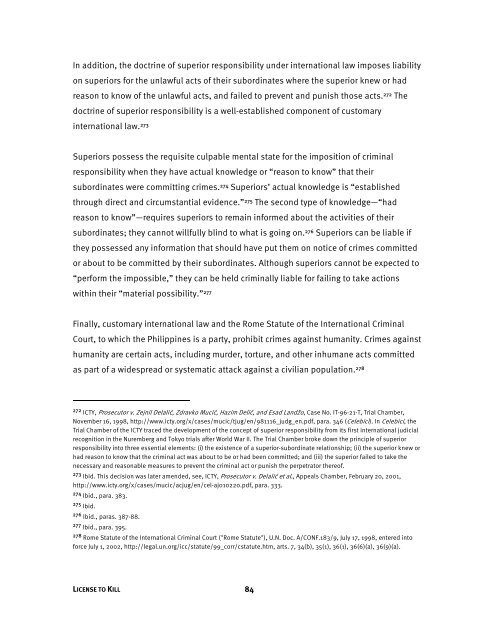“License to Kill”
nDPE309A46S
nDPE309A46S
You also want an ePaper? Increase the reach of your titles
YUMPU automatically turns print PDFs into web optimized ePapers that Google loves.
In addition, the doctrine of superior responsibility under international law imposes liability<br />
on superiors for the unlawful acts of their subordinates where the superior knew or had<br />
reason <strong>to</strong> know of the unlawful acts, and failed <strong>to</strong> prevent and punish those acts. 272 The<br />
doctrine of superior responsibility is a well-established component of cus<strong>to</strong>mary<br />
international law. 273<br />
Superiors possess the requisite culpable mental state for the imposition of criminal<br />
responsibility when they have actual knowledge or “reason <strong>to</strong> know” that their<br />
subordinates were committing crimes. 274 Superiors’ actual knowledge is “established<br />
through direct and circumstantial evidence.” 275 The second type of knowledge—“had<br />
reason <strong>to</strong> know”—requires superiors <strong>to</strong> remain informed about the activities of their<br />
subordinates; they cannot willfully blind <strong>to</strong> what is going on. 276 Superiors can be liable if<br />
they possessed any information that should have put them on notice of crimes committed<br />
or about <strong>to</strong> be committed by their subordinates. Although superiors cannot be expected <strong>to</strong><br />
“perform the impossible,” they can be held criminally liable for failing <strong>to</strong> take actions<br />
within their “material possibility.” 277<br />
Finally, cus<strong>to</strong>mary international law and the Rome Statute of the International Criminal<br />
Court, <strong>to</strong> which the Philippines is a party, prohibit crimes against humanity. Crimes against<br />
humanity are certain acts, including murder, <strong>to</strong>rture, and other inhumane acts committed<br />
as part of a widespread or systematic attack against a civilian population. 278<br />
272 ICTY, Prosecu<strong>to</strong>r v. Zejnil Delalić, Zdravko Mucić, Hazim Delić, and Esad Landžo, Case No. IT-96-21-T, Trial Chamber,<br />
November 16, 1998, http://www.icty.org/x/cases/mucic/tjug/en/981116_judg_en.pdf, para. 346 (Celebici). In Celebici, the<br />
Trial Chamber of the ICTY traced the development of the concept of superior responsibility from its first international judicial<br />
recognition in the Nuremberg and Tokyo trials after World War II. The Trial Chamber broke down the principle of superior<br />
responsibility in<strong>to</strong> three essential elements: (i) the existence of a superior-subordinate relationship; (ii) the superior knew or<br />
had reason <strong>to</strong> know that the criminal act was about <strong>to</strong> be or had been committed; and (iii) the superior failed <strong>to</strong> take the<br />
necessary and reasonable measures <strong>to</strong> prevent the criminal act or punish the perpetra<strong>to</strong>r thereof.<br />
273 Ibid. This decision was later amended, see, ICTY, Prosecu<strong>to</strong>r v. Delalić et al., Appeals Chamber, February 20, 2001,<br />
http://www.icty.org/x/cases/mucic/acjug/en/cel-aj010220.pdf, para. 333.<br />
274 Ibid., para. 383.<br />
275 Ibid.<br />
276 Ibid., paras. 387-88.<br />
277 Ibid., para. 395.<br />
278 Rome Statute of the International Criminal Court ("Rome Statute"), U.N. Doc. A/CONF.183/9, July 17, 1998, entered in<strong>to</strong><br />
force July 1, 2002, http://legal.un.org/icc/statute/99_corr/cstatute.htm, arts. 7, 34(b), 35(1), 36(1), 36(6)(a), 36(9)(a).<br />
LICENSE TO KILL 84


